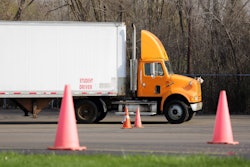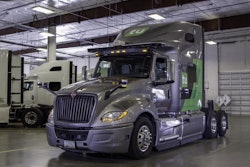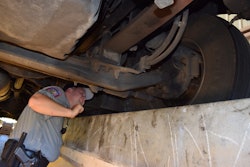Trucking news and briefs for Thursday, June 12, 2025:
California’s driverless truck ban resurfaces, with some changes
The California lawmaker behind two previous attempts to ban driverless trucks in the state is taking a different approach to getting the legislation signed by Gov. Gavin Newsom this time around.
California Assembly member Cecilia Aguiar-Curry in both 2023 and 2024 introduced bills in the state to ban autonomous trucks over 10,001 pounds from operating in the state without a human in-cab. In both years, the bill passed both the State Assembly and the State Senate but were vetoed by Newsom.
This time around, Aguiar-Curry changed her strategy to get the bill signed. Assembly Bill 33 would actually allow driverless autonomous trucks to operate in California, as long as the operation without a human operator on board does not include “the delivery of commercial goods … directly to a residence or to a business for its use or retail sale.”
Violation of the provision would not be classified as a crime, but it would be punishable by a civil fine of up to $25,000 for each violation.
[Related: California governor again spikes driverless truck ban]
“Theoretically, this bill would not prohibit the possibility for the operation of driverless AVs for deliveries, including vehicles over 10,001 pounds, to a business so long as the product is not intended to be used or sold at that location,” according to committee comments within the Assembly Floor Analysis provided in the docket. “It is unclear in the bill what ‘use’ may mean and could be interpreted to mean even storing the product counts as a ‘use.’”
Aguiar-Curry said her bill “protects public safety and supports California's workforce by requiring a human safety operator in autonomous vehicles used for commercial deliveries to homes and businesses.”
She added that the “testing and deployment of light-duty AVs in California have been fraught with malfunctions, including interference with emergency response scenes, collisions, and sudden stops that block traffic. Adding deliveries of countless consumer goods to homes and businesses on local streets and roads throughout the state will result in a proliferation of autonomous vehicles -- meaning that AVs have greater potential to injure and kill Californians and threaten jobs.”
Ultimately, Aguiar-Curry said, “By requiring human oversight, this bill allows AV technology to advance responsibly while prioritizing public safety and creating a pathway for California's transportation workforce to adapt to AV technology."
So far, the bill has cleared its first legislative hurdle by passing the State Assembly with a 57-7 vote. It’s now with the State Senate, where it will need to pass before heading to Newsom’s desk for a potential signature, or veto.
[Related: Senate's budget bill includes changes to AI-tech regulation provision]
Atlas Energy adds two more Kodiak autonomous trucks to fleet
Autonomous trucking system developer Kodiak Robotics has delivered two additional driverless trucks to Atlas Energy Solutions and announced the launch of up to 24/7 driverless service, stopping only for things such as maintenance and refueling.
 Atlas now owns and operates four trucks equipped with the Kodiak Driver, Kodiak's advanced AI-powered autonomous solution. The new Kodiak Driver-powered trucks entered service in late May.Kodiak Robotics
Atlas now owns and operates four trucks equipped with the Kodiak Driver, Kodiak's advanced AI-powered autonomous solution. The new Kodiak Driver-powered trucks entered service in late May.Kodiak Robotics
The two new Kodiak Driver-powered trucks are part of a 100-truck order placed by Atlas as the company seeks to automate its supply chain. The driverless trucks pick up frac sand from Atlas's Dune Express, a 42-mile conveyor system that carries the sand from Atlas's mine closer to well sites. From there, the driverless trucks transport the sand to Atlas's customer well sites across in the Permian Basin, which spans parts of West Texas and Eastern New Mexico.
"Our initial rollout of Kodiak Driver-powered driverless trucks represents a significant operational milestone in our autonomous strategy, creating a clear path to continue scaling our businesses together," said John Turner, President and CEO, Atlas Energy Solutions. "Kodiak's autonomous technology can meaningfully help us address challenges ranging from driver recruitment to demanding operating conditions. We plan to continue adding Kodiak Driver-powered trucks to our fleet helping to strengthen our long-term competitiveness."
Since launching commercial operations with driverless trucks in December 2024, Atlas's Kodiak Driver-powered trucks have delivered more than 800 loads and conducted more than 1,600 hours of driverless service.
Kodiak offers its Kodiak Driver-powered trucks under a Driver-as-a-Service model, where customers pay a per-mile or per-vehicle licensing fee that covers driverless operations and ongoing system support, with its trucks delivering day and night in most weather conditions.
[Related: Kodiak makes first driverless haul on Texas oilfield]
FTR hosting free ‘Key Issues in Transportation’ webinar
FTR (Freight Transportation Research) will host a complimentary webinar, Key Issues in Transportation 2025, designed to help industry professionals navigate a rapidly evolving freight landscape.
The live session will be held Thursday, July 10, at 11 a.m. EDT and is open to transportation, logistics, and supply chain professionals across North America.
FTR said the timely webinar will break down the critical economic, regulatory, and capacity trends shaping decisions for shippers, carriers, brokers, and suppliers. Led by FTR’s team of expert analysts, the session will provide practical insights to help companies make informed, strategic choices – not knee-jerk reactions.
“Whether financial, economic, or freight-related, all markets have suffered through an enormous upheaval during the first half of 2025,” said Jonathan Starks, CEO, FTR. “We are starting to gain more clarity on how trade will settle out; however, we still don't know the full and final impacts as we continue to navigate the deal-making process.”
Key topics to be discussed during the webinar include:
- Freight demand and rate expectations for the second half of 2025
- Supply chain bottlenecks and labor trends
- Regulatory and policy shifts to watch
- Equipment production, inventory levels, and fleet capacity
Registration is free, but spots are limited. Those interested can register here.










